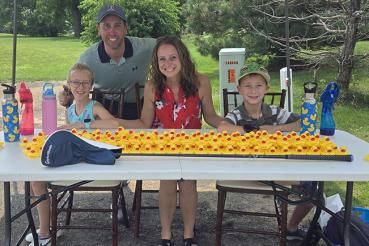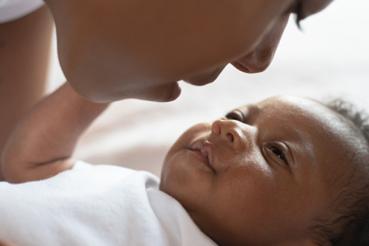Sharon Hayes organized everything for the perfect birth experience — from her music playlist for the delivery room to matching mother-baby outfits to wear home. While overjoyed by the healthy birth of her daughter Jillian, Hayes’ own health issues and emergency C-section undermined her orderly plans. After spending a week in the hospital, she arrived home and suddenly felt overwhelmed.
“Baby was fine, but I was not,” she said. “Even with all the reading, all the research I did, I thought, ‘I am so lost right now.’”
The next morning, she called the Family Connects service, which supports mothers, infants and families by sending a nurse to the home of any baby delivered at RUSH University Medical Center. Families are not required to take part, but for those who choose to, no fee is charged to them or their insurance. The option is available regardless of how many other children the family has.
“We answer any questions the mother or family members have, and we check on the mother’s health as well as the baby’s,” said Jessica Orozco, RN, a Family Connects nurse employed by RUSH College of Nursing’s Academic Practice. “We listen to their concerns and find ways to help. That might be offering guidance on breastfeeding, helping to schedule medical appointments or connecting the family with resources to find child care, employment or food.”
RUSH, Mount Sinai Hospital, University of Chicago Medical Center and Humboldt Park Health worked with the Chicago Department of Public Health to launch the program. CDPH is bringing the service to other hospitals, with the goal of making it available in all Chicago hospitals that deliver babies.
Feeling at home with a newborn
The visit is usually scheduled three weeks after the baby comes home.
“Those first days and weeks, families have a lot to learn, a lot to adjust too, even when it isn’t their first child,” Orozco added.
For Hayes, the home visit was scheduled right away, and she said she received great support over the phone as soon as she called. Her first concern was feeding Jillian. She’d started breastfeeding in the hospital, but that was disrupted by her treatment for blood pressure and kidney issues, including a blood transfusion.
“I only planned for breastfeeding, and I had trouble with it,” she said. “Now at home, I had to transition to formula feeding, which I hadn’t studied up on.”
Between the new routines of feeding, changing and bathing a newborn, recovering from giving birth and trying to get enough sleep, the first hours, days and weeks after delivery can be overwhelming. It also is a risky time for mothers’ and infants’ health, so moms need to be vigilant about caring for their child and themselves.
Postpartum health is goal of growing program
First developed by Duke University, the Family Connects program was launched in Chicago to support the health of infants and address the city’s high rate of maternal mortality, especially among Black women. As a key part of RUSH’s birth equity and health equity commitment, the College of Nursing Academic Practice employs registered nurses to do the home visits.
“The home visit promotes maternal and infant health by helping the mother and family adjust to the baby’s arrival,” said Jennifer Rousseau, DNP, director of Family Connects Chicago at RUSH and associate professor in the College of Nursing. “A significant component of the Family Connects service is listening to women: their birth stories, their concerns, their needs.”
During the home visit, the nurse will:
- Offer support with breastfeeding as well as family planning.
- Help the family learn to feed, bathe, diaper and swaddle the infant and ensure safe sleep practices.
- Check the infant’s health vitals, feeding habits and fussiness.
- Check the mother’s health vitals possible concerns, such as high blood pressure, sugar levels and recovery from a C-section.
- Screen for baby blues and postpartum depression.
- Assess the family’s well-being and connect them with resources for finding child care, employment, food and other resources as needed.
- Plan and schedule baby well-visits and mother’s follow-up appointments.
- Listen to any concerns and answer questions.
Moms say nurse visits are a big help
Latisha Hart, a mom who gave birth to son Landen at RUSH in February, said she chose a nurse home visit, even though she wasn’t sure what support she might need.
“I met with Jess (Orozco), and she was very helpful with a lot of things,” Hart said in an interview with NBC 5 Chicago. “If people are hesitant, I feel like they should reach out, especially if they're in need of some assistance.”
Hayes told WBBM-News Radio that her visit and support from Darlene Hepburn, RN, was a turning point after coming home with Jillian.
Mothers need to know that their individual experience is as valid as the romanticized image of perfection they imagine, Hepburn said.
"You see pictures of people breastfeeding in a field of flowers and think that's the way it's supposed to be," she told Fox 32 Chicago. “And then it ends up being, ‘I'm wearing green pajama pants for two weeks. I haven't showered and I haven't slept.’”




